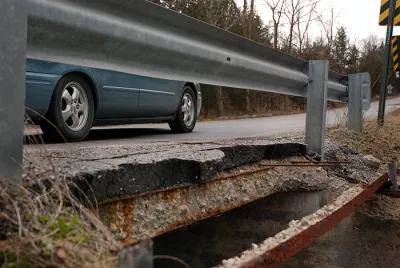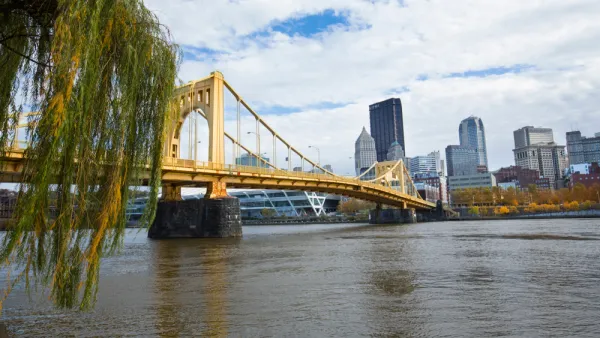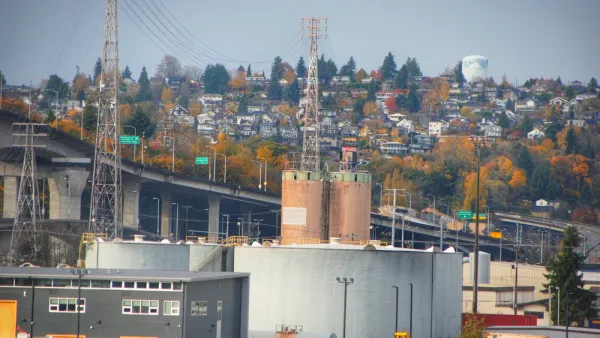The news satire show "Last Week Tonight with John Oliver" gave comic treatment to the country's ever-present, much-neglected infrastructure crisis. It's hilarious and scary. At the same time!

"Last Week Tonight with John Oliver" will help reverse the lack of attention paid to the country's infrastructure (along with a recent "60 Minutes" segment and, of course, constant coverage by Planetizen).
According to Oliver, the country finds it easy to ignore its crumbling infrastructure because: "We tend to find it a bit boring." Or, put another way: "Most people find infrastructure boring."
The show starts by examining dams, noting that the average age of dams in the country is 52 years, but they get very little in the way of inspections. The state of Alabama, for instance, completely lacks inspectors for its dams. "That means that the state of Alabama has exactly the same number of dam inspectors as the band Alabama," cracks Oliver.
The show then switches its focus to bridges, borrowing heavily from the unintentional comedy of the recent "60 Minutes" feature on infrastructure. So, for instance, the Oliver notes the troubling nature of former Transportation Secretary Ray LaHood saying, "I don't want to say they're unsafe, but they're dangerous."
With consensus like this, how did things get so bad? Oliver turns to the Highway Trust Fund, and the gas tax that funds it, as an example of the inability of Congress to act. The problem, as we know, is that taxes are incredibly unpopular, and some in Congress aren't working as hard as they say there to find a new source of funding to replace the gas tax. This tweet from the show make's their opinion known:
Finally, the segment concludes with a star-studded fake movie trailer that tells viewers to "brace yourself for 98 minutes of incremental maintenance." Edward Norton delivers the line "Left loosey, righty tighty" in a particularly tense moment. And Steve Buscemi kills it as the "best damn inspector in the business," who is, "here to inspect this dam."
Robert Puentes reacts to the segment in a post for Brookings, finding a lot to agree with in the show's jokes and satire, but also noting one omission that was probably too complex for the show to fit into a 21-minute comedy segment:
"…it missed the mark by failing to recognize the diverse and highly fragmented ways that America selects, builds, maintains, operates, and pays for assets as different as public transit, telecommunications, and water. To be sure, for certain sectors federal spending is relatively high, such as transportation and water for which federal spending averaged $92.15 billion each year from 2000 to 2007. But even for those sectors, the federal share of total spending was never higher than 27 percent during that time. How choices are made about American infrastructure is exceedingly complex and depends on funding sources, jurisdictional concerns, and political negotiations."
The full segment is available in the video below.
FULL STORY: Last Week Tonight with John Oliver: Infrastructure (HBO)

National Parks Layoffs Will Cause Communities to Lose Billions
Thousands of essential park workers were laid off this week, just before the busy spring break season.

Retro-silient?: America’s First “Eco-burb,” The Woodlands Turns 50
A master-planned community north of Houston offers lessons on green infrastructure and resilient design, but falls short of its founder’s lofty affordability and walkability goals.

Delivering for America Plan Will Downgrade Mail Service in at Least 49.5 Percent of Zip Codes
Republican and Democrat lawmakers criticize the plan for its disproportionate negative impact on rural communities.

Test News Post 1
This is a summary

Test News Headline 46
Test for the image on the front page.

Balancing Bombs and Butterflies: How the National Guard Protects a Rare Species
The National Guard at Fort Indiantown Gap uses GIS technology and land management strategies to balance military training with conservation efforts, ensuring the survival of the rare eastern regal fritillary butterfly.
Urban Design for Planners 1: Software Tools
This six-course series explores essential urban design concepts using open source software and equips planners with the tools they need to participate fully in the urban design process.
Planning for Universal Design
Learn the tools for implementing Universal Design in planning regulations.
EMC Planning Group, Inc.
Planetizen
Planetizen
Mpact (formerly Rail~Volution)
Great Falls Development Authority, Inc.
HUDs Office of Policy Development and Research
NYU Wagner Graduate School of Public Service





























